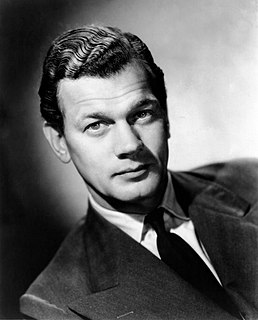
Joseph Cheshire Cotten Jr. was an American film, stage, radio and television actor. Cotten achieved prominence on Broadway, starring in the original stage productions of The Philadelphia Story and Sabrina Fair. He then gained worldwide fame in three Orson Welles films: Citizen Kane (1941), The Magnificent Ambersons (1942), and Journey into Fear (1943), for which Cotten was also credited with the screenplay.

Walter Davis Pidgeon was a Canadian-American actor. He earned two Academy Awards for Best Actor nominations for his roles in Mrs. Miniver (1942) and Madame Curie (1943). Pidgeon also starred in many films such as How Green Was My Valley (1941), The Bad and the Beautiful (1952), Forbidden Planet (1956), Voyage to the Bottom of the Sea (1961), Advise & Consent (1962), Funny Girl (1968), and Harry in Your Pocket (1973).

Studio 54 is a Broadway theater and a former disco nightclub at 254 West 54th Street in the Midtown Manhattan neighborhood of New York City. Operated by the Roundabout Theatre Company, Studio 54 has 1,006 seats on two levels. The theater was designed by Eugene De Rosa for producer Fortune Gallo and opened in 1927 as the Gallo Opera House. The current Broadway theater is named after a nightclub on the same site, founded by Steve Rubell and Ian Schrager, which operated within the theater's space from 1977 to 1980.

Michael Arlen, born Dikran Kouyoumdjian, was a British essayist, short story writer, novelist, playwright, and scriptwriter of Armenian origin, who had his greatest successes in the 1920s while living and writing in England. Arlen is most famous for his satirical romances set in English smart society, but he also wrote gothic horror and psychological thrillers, for instance "The Gentleman from America", which was filmed in 1956 as a television episode for Alfred Hitchcock's TV series Alfred Hitchcock Presents. Near the end of his life, Arlen mainly occupied himself with political writing. Arlen's vivid but colloquial style "with unusual inversions and inflections with a heightened exotic pitch" came to be known as 'Arlenesque'.

Jobyna Ralston was an American stage and film actress. She had a featured role in Wings in 1927, but is perhaps best remembered today for her on-screen chemistry with Harold Lloyd, with whom she appeared in seven films.

John Marriott was an American actor of the stage, film and screen, whose career spanned five decades. His acting career began on the stage in Cleveland, prior to his moving to New York City, where he was a regular performer on the Broadway stage. In the 1940s he also began to perform in films, when he reprised his role from the hit Broadway play, The Little Foxes, in the William Wyler movie of the same name, starring Bette Davis. While he appeared infrequently in films, he was quite active in theater, both on Broadway and in regional productions. His final performance was on-screen, in the Al Pacino film, Dog Day Afternoon.

Hiram Sherman was an American actor.

Mary Duncan was an American stage and film actress. She is best known for her performances in F.W. Murnau's City Girl (1930) and Morning Glory (1933).

Violet Heming was an English stage and screen actress. Her name sometimes appeared as Violet Hemming in newspapers.

Lola May was an American silent film and stage actress.

Olive Frances Wyndham Meysenberg was an American actress on stage and in silent films.

Myrtle Tannehill Nichols was an American actress on stage and in silent films.

Cleo Empey, better known by the stage name Cleo Mayfield, was an American actress and singer.
John Henry Clanfergael Buckler was a British actor. He was the son of the actor Hugh Buckler and his wife, actress Violet Paget, about whom little is known.
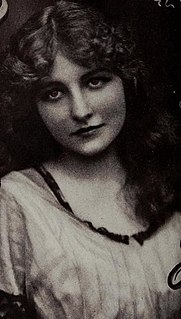
Isabel Lamon, also billed as Isabel Baring, was an American actress in silent films. Among many roles, she played Meg March in the second filmed adaptation of Louisa May Alcott's Little Women.

Alta L. King was an American dancer, singer, and Ziegfeld girl in musical theatre.
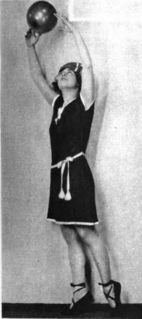
Claiborne Foster was an American stage actress, born Claiborne Foster Comegys.

Rebekah Earle Cauble, also known as Rhea Cauble and later as Rebekah Halee, was an American stage actress.
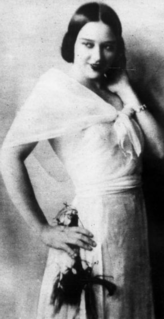
Lucita Covera, born Lucetta Reynolds, sometimes seen as Lucita Corvera Hall or Lucita Ward, was an American dancer in Broadway shows and other revues. She was described as the "Most Perfect Girl" in publicity.
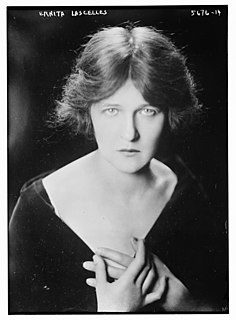
Ernita LascellesRanson was an English actress, novelist, and playwright.



















